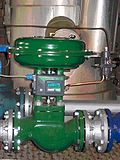Instrumentation
Instrumentation refers to the devices, systems, and tools used in various fields to measure, monitor, and control physical quantities. In the medical field, medical instrumentation plays a crucial role in diagnosing, monitoring, and treating patients.
Overview[edit]
Medical instrumentation includes a wide range of devices, from simple tools like thermometers and stethoscopes to complex machines like MRI scanners and ultrasound machines. These instruments are used to measure various physiological parameters, such as body temperature, blood pressure, heart rate, and more. They are essential for providing accurate diagnoses and effective treatments.
Types of Medical Instrumentation[edit]
Diagnostic Instruments[edit]
Diagnostic instruments are used to identify diseases and conditions. They include tools like X-ray machines, CT scanners, and blood glucose meters. These instruments provide doctors with the information they need to make accurate diagnoses.
Therapeutic Instruments[edit]
Therapeutic instruments are used to treat diseases and conditions. They include devices like insulin pumps, pacemakers, and dialysis machines. These instruments help manage chronic conditions and improve patients' quality of life.
Monitoring Instruments[edit]
Monitoring instruments are used to track patients' health over time. They include devices like heart rate monitors, blood pressure monitors, and respiratory monitors. These instruments provide real-time data that can help doctors detect changes in a patient's condition and adjust treatment plans accordingly.
Importance of Medical Instrumentation[edit]
Medical instrumentation is essential for modern healthcare. It allows doctors to diagnose diseases accurately, monitor patients' health effectively, and provide appropriate treatments. Without these tools, healthcare professionals would be unable to provide the high level of care that patients need and deserve.
See Also[edit]
Ad. Transform your life with W8MD's Budget GLP-1 injections from $75


W8MD offers a medical weight loss program to lose weight in Philadelphia. Our physician-supervised medical weight loss provides:
- Weight loss injections in NYC (generic and brand names):
- Zepbound / Mounjaro, Wegovy / Ozempic, Saxenda
- Most insurances accepted or discounted self-pay rates. We will obtain insurance prior authorizations if needed.
- Generic GLP1 weight loss injections from $75 for the starting dose.
- Also offer prescription weight loss medications including Phentermine, Qsymia, Diethylpropion, Contrave etc.
NYC weight loss doctor appointmentsNYC weight loss doctor appointments
Start your NYC weight loss journey today at our NYC medical weight loss and Philadelphia medical weight loss clinics.
- Call 718-946-5500 to lose weight in NYC or for medical weight loss in Philadelphia 215-676-2334.
- Tags:NYC medical weight loss, Philadelphia lose weight Zepbound NYC, Budget GLP1 weight loss injections, Wegovy Philadelphia, Wegovy NYC, Philadelphia medical weight loss, Brookly weight loss and Wegovy NYC
|
WikiMD's Wellness Encyclopedia |
| Let Food Be Thy Medicine Medicine Thy Food - Hippocrates |
Medical Disclaimer: WikiMD is not a substitute for professional medical advice. The information on WikiMD is provided as an information resource only, may be incorrect, outdated or misleading, and is not to be used or relied on for any diagnostic or treatment purposes. Please consult your health care provider before making any healthcare decisions or for guidance about a specific medical condition. WikiMD expressly disclaims responsibility, and shall have no liability, for any damages, loss, injury, or liability whatsoever suffered as a result of your reliance on the information contained in this site. By visiting this site you agree to the foregoing terms and conditions, which may from time to time be changed or supplemented by WikiMD. If you do not agree to the foregoing terms and conditions, you should not enter or use this site. See full disclaimer.
Credits:Most images are courtesy of Wikimedia commons, and templates, categories Wikipedia, licensed under CC BY SA or similar.
Translate this page: - East Asian
中文,
日本,
한국어,
South Asian
हिन्दी,
தமிழ்,
తెలుగు,
Urdu,
ಕನ್ನಡ,
Southeast Asian
Indonesian,
Vietnamese,
Thai,
မြန်မာဘာသာ,
বাংলা
European
español,
Deutsch,
français,
Greek,
português do Brasil,
polski,
română,
русский,
Nederlands,
norsk,
svenska,
suomi,
Italian
Middle Eastern & African
عربى,
Turkish,
Persian,
Hebrew,
Afrikaans,
isiZulu,
Kiswahili,
Other
Bulgarian,
Hungarian,
Czech,
Swedish,
മലയാളം,
मराठी,
ਪੰਜਾਬੀ,
ગુજરાતી,
Portuguese,
Ukrainian










